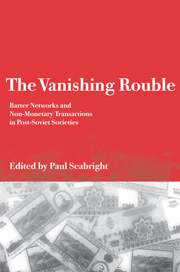Book contents
- Frontmatter
- Contents
- List of figures
- List of tables
- List of boxes
- Preface
- List of contributors
- Introduction: barter networks and ‘information islands’
- I Theory
- II Large-scale empirical studies
- 4 Barter in post-Soviet societies: what does it look like and why does it matter?
- 5 The growth of non-monetary transactions in Russia: causes and effects
- 6 Barter in Russia
- 7 The household in a non-monetary market economy
- 8 Barter in transition economies: competing explanations confront Ukrainian data
- 9 Barter and non-monetary transactions in transition economies: evidence from a cross-country survey
- III Ethnography
- Conclusion: what is to be done?
- Index
7 - The household in a non-monetary market economy
Published online by Cambridge University Press: 05 May 2010
- Frontmatter
- Contents
- List of figures
- List of tables
- List of boxes
- Preface
- List of contributors
- Introduction: barter networks and ‘information islands’
- I Theory
- II Large-scale empirical studies
- 4 Barter in post-Soviet societies: what does it look like and why does it matter?
- 5 The growth of non-monetary transactions in Russia: causes and effects
- 6 Barter in Russia
- 7 The household in a non-monetary market economy
- 8 Barter in transition economies: competing explanations confront Ukrainian data
- 9 Barter and non-monetary transactions in transition economies: evidence from a cross-country survey
- III Ethnography
- Conclusion: what is to be done?
- Index
Summary
Introduction
The Russian economy is ‘non-monetary’ in the sense that the bulk of inter-enterprise and even governmental transactions are not conducted in monetary form but through barter chains and the use of various kinds of non-monetary instruments. However, retail trade and the provision of consumer services are almost entirely monetary: it is not possible for households to issue bills of exchange to buy their groceries or to settle their utilities bills, nor is it generally possible to acquire goods in shops or retail markets for anything other than cash. While enterprises and government bodies have adapted quite comfortably to life without money, households with falling money incomes have a steadily declining capacity to meet even their most basic needs directly through the market.
Households are the primary victims of demonetisation, but they are not necessarily passive victims. Household responses to demonetisation have important implications for the reproduction of the non-monetary market economy. If households respond in the normal way to falling money incomes – by drawing on their savings, falling into debt and reducing their money spending – then demonetisation will translate, perhaps with a lag as savings are run down, into an old-fashioned Keynesian deflationary spiral. On the other hand, if employers arrange to pay wages and benefits in kind or with non-monetary tokens (or quasimonies) which can be used to purchase means of subsistence, households will be integrated into the non-monetary economy and will be able to sustain their demand for goods and services despite their falling money incomes.
- Type
- Chapter
- Information
- The Vanishing RoubleBarter Networks and Non-Monetary Transactions in Post-Soviet Societies, pp. 176 - 206Publisher: Cambridge University PressPrint publication year: 2000
- 5
- Cited by



